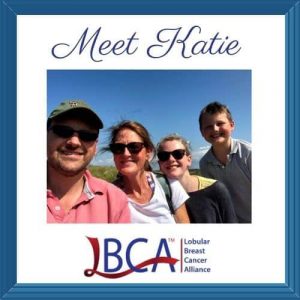Many women with lobular breast cancer who have found their way to the Lobular Breast Cancer Alliance (LBCA) after they were diagnosed want to help build a community among peers, to share the most current information about ILC detection, treatment and clinical trials, and to raise awareness about this common yet understudied and sneaky breast cancer that needs more research. Sharing their stories is just one of those ways.
Meet Katie
I am Katie, aged 56. I live south of London in the UK, in an area called the ‘Surrey Hills.’ I am married and have two children. Until three years ago I owned and ran my own PR company. I have now sold it and am full time mum, gardener, and house renovator.
My primary cancer was diagnosed when I was 50 by my general practitioner (GP), following mild pain in my right breast when my then five-year-old jumped on me. It was a complete shock. No one in our family has had cancer. It did not show up in a mammogram. It was only confirmed by biopsy. I had no knowledge of the different types of breast cancer at this stage, so just took the advice given by the oncologist and tried to resist Googling my condition.
In December 2014, I had a right-side mastectomy and full lymph node clearance followed by chemotherapy and radiotherapy. After that, I was prescribed Tamoxifen and underwent an annual PET CT scan for monitoring.

Despite a clear PET CT scan last September, I started to experience stomach problems in May 2020, which were diagnosed as metastatic breast cancer, once again ILC as with my primary. Small patches of the cancer were also found in my pelvis and spine. It turned out the ILC in my stomach has not formed a mass; instead, it has infiltrated the stomach wall in a ‘diffuse’ way, which evades visibility on most scans.
I am now taking Ribociclib (Kiskali) with Letrozole. As I write my story, I am on round six and have had two positive investigations in the last fortnight: an endoscopy which showed substantial improvement in the stomach, and stable results for the spine mets from a diffusion MRI scan.
I found out about the LBCA through web research and wish I had known about it first time round. The ‘sneaky’ nature of ILC was not explained to me. I feel better information about this specific type of cancer, like that found on the LBCA website, could have been very helpful.
Would you like to tell others your ILC story? Please email communications@lobularbreastcancer.org to request more information on how to submit your story.

